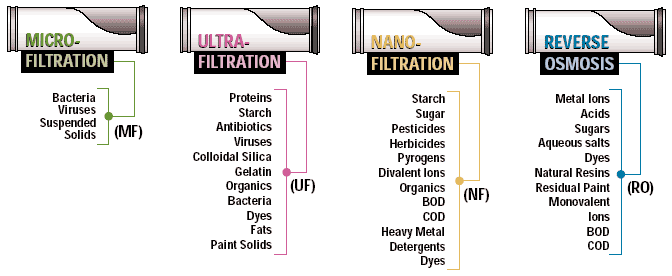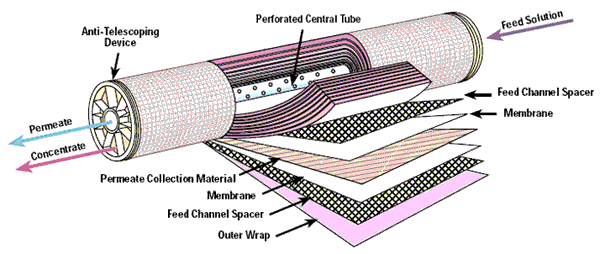The Genesis of Membrane Technology
Developed for fluid treatment in residential, commercial and industrial
applications, the use of membranes to selectively remove or separate extremely
small substances from water and process streams has become a technological
success story. There are four types of membrane filtration and separation
technologies in commercial use today, effectively removing substances ranging in
size from suspended solids to ionic species.

Benefits of Membrane Separation
Many industries are utilizing various technologies to minimize fresh water
purchases and wastewater disposal. Few technologies, however, achieve the
greater objectives of economically extracting valuables from the waste stream
and improving product quality and/or process efficiencies. These are the
challenges that membrane technology undertakes.
Membrane systems for multiple industries
that routinely separate and concentrate acid, caustic, CMC, dye, glycol, ink,
lignin, lubricant, metal, oil, protein, PVA, solvent, sugar, starch, titanium
dioxide, water and other valuables from product and waste streams. Similarly,
membrane systems that reduce BOD, COD and TDS pollutants
prior to open water discharge, and others that concentrate radioactive and toxic
contaminants for economic disposal.

Industries We Serve
Automotive
- Improving the Painting Process |
 |
Beverage
- Enhancing Beverage Taste and Colour |
 |
Biotech & Pharmaceutical
- Prescription for purity. The biotech and pharmaceutical
industries use membrane separation technology for a variety of purposes,
including laboratory purification, as well as separation and concentration
during both pre-filtration and sterilization. For the ever growing biotech
industry, UF and NF are used to purify and concentrate antibiotics. To
control water purity, RO and UF are utilised to remove suspended material,
iron, manganese, alkalinity, dissolved solids and other contaminants.
Similarly, membrane filtration is used to purify water for injection, a
vital component in most injectable drugs. Spiral-wound membrane systems
are also used to purify water for kidney dialysis, which is then used to
remove impurities from a patient's blood. |
 |
Chemical
- Reducing Hazardous Chemicals for Safe
Disposal |
 |
Dairy
- Revolutionising the Dairy Industry |
 |
Electronics
- Recovering and Reusing Expensive Acids |
 |
Food
- Streamlining the Food Processing Industry |
 |
Laundry & Washing
- Recycling Laundry Water |
 |
Metalworking
- Purifying Water for Use in
Metalworking |
 |
Mining
- Recovering the riches. The mining industry produces large
quantities of process water laden with acid and dissolved metals.
Typically accumulated in ponds, this process water poses potential ground
water pollution problems and is neutralized with large quantities of lime,
However, the implementation of NF and thin-film UF membrane elements has
enabled the mining industry to recover both economically valuable metals
and reusable water from the acid-water mixture, leading to an increase in
lime neutralization efficiency and a corresponding decrease in costs
related to lime purchase and sludge disposal.
|
 |
Petroleum and Gas
- Fuelling the oil industry. In the field of petroleum and gas,
UF is used to separate oil and water. Specially constructed membrane
elements resist common problems such as fouling from free oil, oil
de-emulsification as feed is concentrated, and accidental contamination of
the waste stream by solvents. In addition, many industrial plants utilize
UF to remove hydrocarbons, free oils, acids and polar organic solvents
from the waste stream.
|
 |
Municipal
- Clearly better. Advantages such as reduced feed water
requirements, longer equipment life, and reduced chemical usage all make
membrane technology ideal for municipalities. Membrane elements remove
various impurities from the source water, including metal ions, organic
materials and other contaminants. Removal of organics from surface water
reduces the risk of formation of carcinogenic trihalomethane.
Packaged RO/Ozone filtration systems. The revolutionary purification
process greatly improves water quality by reducing salts, colour, and
disinfection by-products. The result is pure, crystal clear drinking water
exceeds EPA regulations.
|
 |
Power
- The power to purify. Membrane technology is used in the power
generation industry to produce high-purity water for boilers and gas
turbine injection. RO is employed in high- and low-pressure boiler
applications to remove free chlorine, silica, hardness, TDS, CO2 and other
contaminants. With a smaller footprint for space efficiency and the
elimination of harsh chemicals, RO/EDI systems are fast becoming the new
standard for pure-water performance at the world's leading power
companies. |
 |
Pulp and Paper
- Utilising RO, NF, UF and MF to successfully reduce discharge of
organic water pollutants, recycle water and recover valuable products |
 |
Seawater Desalination
- Turning Saltwater into
Drinking Water |
 |
Textiles
- Increasing Profits and Recovering Dyes |
 |
As an OEM we can help your company save money and
materials.
|